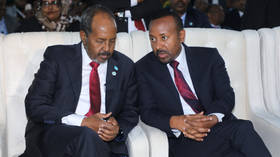Egypt rejects Ethiopia-Somaliland port deal
Egyptian President Abdel Fatah el-Sisi has declared support for Somalia in the Horn of Africa nation’s dispute with landlocked neighbor Ethiopia.
Tensions have escalated since the start of the year, when Addis Ababa struck a deal with breakaway Somaliland to gain access to the Red Sea and build a marine force base.
During a joint press conference with Somali President Hassan Sheikh Mahmoud in Cairo on Sunday, Sisi suggested that Ethiopia should use ports in Somalia and Djibouti for its maritime trade, rather than attempting to “control” another country's territory.
“We will not allow anyone to threaten Somalia or infringe upon its territory. No one should attempt to threaten Egypt’s brothers, especially if our brothers asked us to stand with them,” Sisi told reporters.
Under the January 1 agreement, Somaliland – which declared independence from Somalia in 1991 but has not been internationally recognized as an independent state – offered to rent 20km (12 miles) of coastland around the port of Berbera on the Gulf of Aden to Ethiopia for 50 years. This would allow the landlocked country, which has relied on Djibouti's port for the majority of its maritime trade for more than three decades, to gain access to the sea while also constructing a military base.
The Ethiopian government regards the agreement as a major victory in its long-standing goal of accessing one of the world's major trade routes in order to boost the economy. However, Somalia has condemned it as an act of aggression and a breach of its territorial integrity.
Last week, Mogadishu rejected calls by the African Union for mediation in its feud with Ethiopia, insisting that a resolution is only possible if Addis Ababa cancels the "illegal" pact with the "northern territory," referring to Somaliland.
The Somali government's appeals for international support against the maritime deal prompted the 22-nation Arab League to label the arrangement "a clear violation of international law."
Cairo, which has been locked in a years-long dispute with Ethiopia over the filling and operation of Grand Ethiopian Renaissance dam on the Blue Nile, previously pledged its support for Somalia's territorial integrity. Last week, the Egyptian Foreign Ministry referred to Ethiopia as a source of regional instability.
On Sunday, Redwan Hussien, national security advisor to Ethiopian Prime Minister Abiy Ahmed, described condemnations of the deal as "jingoism" designed to sow discord and chaos.
“The signed MoU with Somaliland is a deal for cooperation and partnership that grants Ethiopia access to sea on business terms. It isn't annexation or assumption of sovereignty over the territory of any state,” Hussien wrote on X (formerly Twitter).













